Oh, how much we tend to cling to an imaginary past, considering the lost paradise on the one hand and a rosy future, somewhat stenciled on the other. This article will seek to contradict these feelings in the context of the Olympic Games and especially in relation to their renewal.
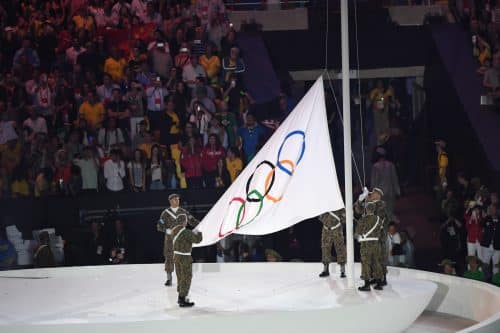
Perhaps one of the ugly and outrageous dramatic images we will take with us from the last Olympic Games in Rio de Janeiro is the absence of the traditional handshake between the judokas - Or Sassoon from Israel and his Egyptian opponent. This event perhaps most of all reflects the saying: "One picture is worth a thousand words", and I would like to emphasize in this context precisely the burning of politicization in sports.
Let's not be naive. The fact that sport as a processual sublimation of military-combat conflicts already much more than signals the affinity between sport and politics and perhaps from an opposite but complementary point of view - the affinity between politics and sport, because any competition, and especially that derived from physical contact, sometimes painful and violent, raises the level of adrenaline and testosterone in the body of the contestant, and this is wrapped up in a national framework, I mean politically.
Egyptian judoka Islam El Shehaby loses to Israeli Or Sasson, refuses to shake hands in a major breach of etiquette. pic.twitter.com/kOU1oAd5YW
— Zaid Benjamin (@zaidbenjamin) August 12 2016
True, I did not invent the wheel here, but I came to say that the modern Olympic Games, which were cut from the ancient Olympic dimensions, and which stood on a universal, anti-political and anti-national basis from the very beginning, simply could not escape the "Siamese twins" of a close connection between sports and politics.
And it all began with a fierce struggle between years, saturated with bloody wars between France and Germany, long before the outbreak of the two world wars. The stinging defeat that France suffered at the hands of the Germans in 1870, including the loss of the Alsace-Lorraine territories, left a mark on the hearts of its citizens, and the Republican police grew a line of opponents from among the monarchists, who were therefore looking for the "Archimedes point" - we were a catalyst that would rescue the French from the sense of loss. The rescuer materialized in the form of a charismatic personality, a French baron named Pierre de Coubertin. Here, from the data above, and against the background of the fact that he made a sharp and harsh criticism towards the laxity of the French education; who attributed great importance and precedence to the natural, aristocratic elite; who was imbued with a romantic influence from the elitist "upboy" (youth/adults) in classical Hellenic gymnastics and from the British education in public schools (which were nothing but aristocratic schools for all intents and purposes such as Eton), who placed physical practice and group games as his backbone to cultivate qualities Humanity and the design of the civil, political and military character. Well, immersed in this atmosphere rewarded the heart of Baron de Coubertin with the decision to raise the mighty and magical enterprise of renewing the Olympic Games.
Here we will stop and highlight first and foremost the dissonance, the heterodox, that were embedded in the very renewal of this huge enterprise. We were the contradiction (or maybe not) between the idea of the revival of the dream about the ancient past and the gray reality of the world before the First World War and especially after the Second World War.
Sound complicated and complex? Maybe? I will try to clear up the tangle later.
Coubertin's dream, and again in the context of the image of the earlier era and the desire to correct the contemporary image of it, was to perpetuate with his flag the idea of universal athletics on the purity of amateurism. In this way, Coubertin believed that he would pave the way towards the establishment of world peace (along the lines of the Greek peace) and the creation of a new religion - the cult of beauty. Even so, in the sign of the revival of the ancient classical ideal. And also - the ideal of physical fitness, the design of fair competition, true amateurism (?) and a pure spirit of play. All of these, Coubertin was inclined to believe, would be well used by the French aristocracy to lubricate the track of its return to the throne of power and restore to France the crown of glory that had fallen from its head following the disasters it had suffered at the hands of the Germans. So it turned out that the tested prescription, in Coubertin's opinion, for removing the French restriction from this and his international dream from this, was folded in the audacity of trying to renew the Olympic games that sank and disappeared about 1400 years ago.
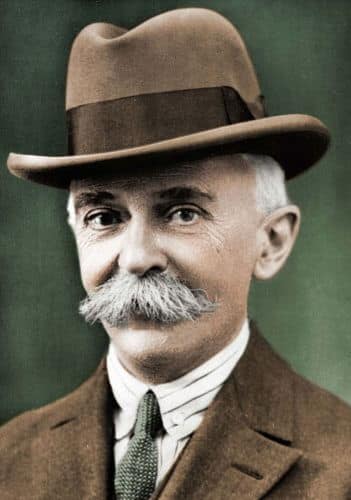
Coubertin's dream was almost shattered to pieces when he heard that his sworn rivals from Germany had raised from the female abyss the antiquity of ancient Olympia, and this under the direction of Prof. Ernst Curtius from the University of Berlin. And then the same urgent idea came to his mind about resuming the Olympic Games and thereby striking the Germans a victorious blow and disabling the joy of the country's citizens. Does envy of writers breed wisdom? Maybe?
Coubertin worked day and night in order to mobilize the French government for the realization of his dream and indeed won it, after the Parisian Sorbonne University strengthened his hands well.
Coubertin then coined the term "Olympism" for the first time, in which three important messages were folded into his theory: first - the religion of Olympism. That is, a completely amateur competition; Second - hello to Olympism. That is, international peace and the pursuit of a more valuable humanity; Third - the beauty of Olympism. That is, striving for an ideal harmony between body, spirit and soul.
Let us disassemble and dissect, theoretically of course, Coubertin's work, which is important in itself without a shadow of a doubt, regarding the renewal of the Olympics in the sign of ancient times, and this through three chronological prisms: past, present and future.
The ancient, Hellenic past was indeed a symbol and model for Coubertin's idealization and romanticization, but as a matter of fact, it had quite a few ugly, somewhat dark sides, at least from the point of Coubertin's dream. First - the ancient Olympic games were tainted by politicization due to their connection to Hellas (the central half of the Balkan Peninsula) only and slowly spread geographically, exclusively to Greek speakers and its culture; Second - the competitions are intended for Polis citizens only. It follows that they were sewn only to the aristocratic layer; Thirdly - the games, seemingly amateurish, when the winning athletes were decorated with a wreath woven from the branches of the olive tree, were tainted by the transfer of large sums of money to the winners. Every city, Polis of course, worried about the lack of conductors (which was not lacking at all). Every city feared, and rightfully so, that the winning athletes, and at least those with the highest potential for victory, would wander from place to place with the intention of being donated and funded by any urban elites. Indeed, over the years this process has become common; Fourth - over time, professional associations - collegiate - of athletes were created, which would offer their sports services to anyone who would pay the highest price; Fifth - quite a few times athletes have been caught trying to bribe judges and local Olympic committees in order to promote themselves in one or another competition; Sixth - the peace that was announced ahead of time for the period of the month of the games has been violated many times. First, at the beginning of the ancient Olympic enterprise, the violating cities were severely punished to the point of demolishing the city and selling its inhabitants into slavery, which seems excessive in the historical aspect, and over time the ancient Olympic committee was satisfied with protests only; Seventh - it is true that the main motto in the essence of ancient Greek athletics was "a healthy mind in a healthy body" and the sanctity of the athletic body, but this collapsed over time. It is not for nothing that all kinds of legends and parables were born about the importance between the body and the mind in terms of corrective instruction, but that the very competitions themselves were designed to develop the strong body on the one hand and its delicacy on the other - such as the pentathlon (fight of five) which included wrestling to a certain extent (what was called in Greek - "wrestling upright), short running, long jump, javelin throw and discus throw, with each discipline designed to develop and cultivate different muscle systems among others (something like modern day combat), but over time this discipline was pushed aside due to the fact that athletes chose to specialize in one discipline and at most in two Eighth - the fact that the athletes were required, on the eve of their arrival at Olympia, to swear in front of the massive and menacing statue of Zeus, that they had not broken any laws and that they were Greeks by all means, shows that this instruction arose from a cynical, realistic approach to life.
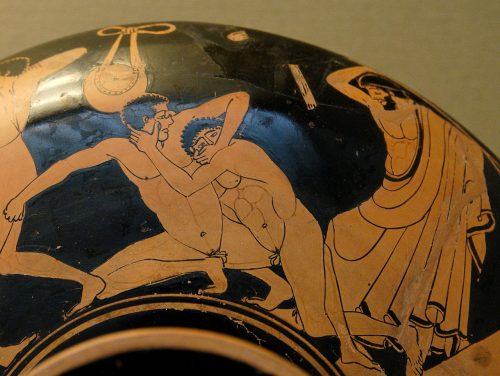
God forbid, I did not come to accuse Coubertin of fraud, but that the heroization and glorification of the ancient era on the one hand and his somewhat obsessive desire to renew the Olympic Games as a sign of the revival of the values of the distant, very distant past, caused the corners to be rounded, the circle to be squared to a certain extent, as if the past must be renewed with such and such slogans, which as which we have shown above was not free to say the least from tattooing basic ideas.
We will move from here to the present, that is to the end of the 19th century, and we will emphasize that Coubertin's intentions regarding the renewal of the Olympic Games were tainted with politicization for its own sake. First - his ambition was to beat the Germans by hurting their dignity, after they had humiliated the French army more than once and how could this reconcile with his dream of world peace?; Second - as an anti-liberal, as a monarchist and certainly as an aristocrat, he expected to strengthen his political and socio-economic positions through the strengthening of physicality among the French youth and how could these stand together with the amateurs in sports, which he sought to cultivate? ; Third - how can the principle of the religion of physical beauty and its worship reconcile with Coubertin's Christian faith?
We will move from here to the future. A chronological date that Coubertin had no control or touch at all, but at the level of appreciation and gut feeling. Well what did the future show? This showed that in the long run of the Olympic Games, the majority of the sacred Coubertin principles were broken, and first and foremost the politicization of the Olympic sports events, and of course we will mention only a microscopic number of examples and illustrative cases.
The first renewed Olympics that took place in Athens in 1896 was free of any oppressive and disappointing incident, as was the next Olympics, in 1900 in Paris.
In the third Olympics in St. Louis (1904), "testing tests" were held to measure the achievements of the athletes of the "inferior races" (African-Americans, Japanese and Indians) and here for the first time the principle of Coubertin's cosmopolitanism was broken and athletes arrived as representatives of the launching countries.
The London Games of 1908 were marked by enormous tensions on a national-moral-principle basis, such as between the British Dominions and South Africa, Australia and Ireland. The British "forgot" to raise the American flag among the other miracles of the nations, and on the other hand, the American delegation in the "Rondo" of the opening ceremony refused to raise its national flag when it passed the seat of honor of King Edward VII and Queen Alexandria, arguing that the Stars and Stripes flag should not be Prostrate before flesh and blood.
At the fifth Olympics (1912 in Stockholm) we discussed the question of amateurs in sports - an issue that began to dissolve from then on, and the one who paid a heavy price for this was Jim Thorpe, an American of Indian origin, champion of the five-fight and the ten-fight, who had all his achievements disqualified on the lame and pressing claim that non- Once in his youth he played baseball for a fee.
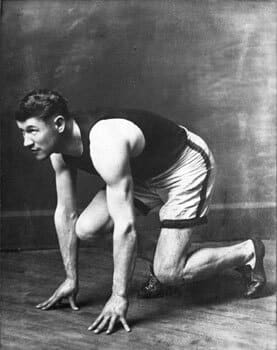
The sixth Olympiad, which was intended to be held in Munich (how cynical?!), was canceled due to the days of the First World War, but was counted as such in the Olympic number, as if it had been worn, as was customary in the ancient era. German and Austrian athletes were not invited to the Seventh Olympiad in Antwerp in 1920 because they were accused of initiating the outbreak of the First World War. It was an unusual political move - both due to its lack of connection to sports and due to turning a blind eye to other countries. A similar fate fell on the part of Russia (the Soviet Union at the time) against the background of the American-European fear of Bolshevism, the "poisoner" - so according to the claim "the sport".
The 11th Olympics was completely immersed in political levers. The Berlin Games of 1936 were meant to open a "window of opportunity" for the admiration of Nazism and how cynical and grotesque the awkward situation was when Hitler refused to shake the hand of the hero of the Games, the African-American who answered J.C. Owens, the world record in six disciplines and who won four gold medals. How, Hitler wondered, this black-skinned, inferior, would defeat the German candidate and more in public.
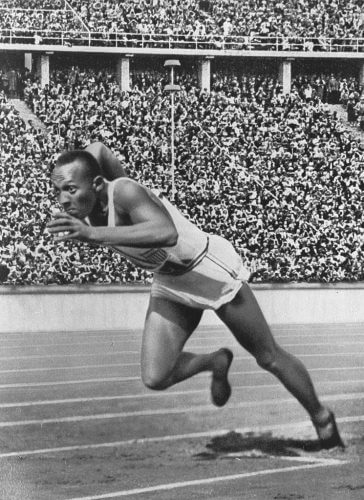
From here we will roll to the twentieth Olympics, the one hosted in Munich, Germany in 1972, during which XNUMX Israeli athletes were murdered by a group of terrorists belonging to the organization "Black September" - a brutal, political-nationalist-religious-Orthodox move unprecedented in the Olympic Games, which was trampled on with rudeness that cries out to the heavens Coubertin's dreams-principles (for a gruesome reminder - a prestigious sporting murder took place in the Jewish Temple during the Second Temple period during a run, a few centimeters before the altar between two priests. I referred to this at the time in one of the episodes of the "Song of the Muscles" series).
We will skip "easily" to the 1980 Moscow Games, the 22nd in the Olympic series. These were covered by a heavy cloud of politicization in sports following the Soviet imperialist front that reached its peak with the Red Army's invasion of Afghanistan, and in response the US president, Jimmy Carter, made a desperate call to boycott the games. The call for a boycott was doomed to a relative failure due to poor support for the boycott front (supported by the USA, Germany and Japan) and how cynical and grotesque the end of the Olympics was with an amazing human display performed by the soldiers of the "Red Army" who resembled the Russian icon - the bear "Mishka" - who was separated from the participating athletes and - The eye could notice a tear falling from one of his eyes - a tear of excitement? A sentimental farewell tear? Or a tear of disappointment.
The Los Angeles Games of 1984, the 23rd in the series, were marked by the Soviet counter-boycott, as a kind of retaliatory action to the American boycott. This boycott was joined by 19 against 140 who chose to appear who were boycotted, politically and somewhat personally by the Soviets. At these games, in the cultural tangent, a congress was held for the culture of sports, in which I delivered a lecture about the socio-political foundations among the Jews of Alexandria in the ancient period. And from there to Seoul ... to London and Rio and ... see you in Tokyo.
So what did we have? A Cobertanian dream that rested on the idealization and glorification of the early Olympic era and was well immersed in a national-nationalist and even personal European atmosphere and it was only natural, mercifully, that its principles would be trampled during the modern Olympics, such as amateurism, the principles of peace, cosmopolitanism and more.

4 תגובות
Pretty.
The article tries to give political motives behind the scenes of the Olympic Games. There is nothing wrong with that.
Dr. Yachiam Sorek's response to Hori's response
Firstly - one should not look for the message in every article, secondly - those looking for the message will dig deeper and find it, thirdly - the message is sometimes hidden in the eyes of the beholder, fourthly - to our point: sometimes we wrap some idea, and especially with the passing of the years, in sweet cellophane, something of a kind of glorification, sometimes biased. The matter also gets more complicated when you delve into the contradiction between reality and vision, and dream, in connection with the ancient Hellenic messages, and even in Coubertin's personal case, when one part of his mind conceived a certain fabric but his heart prevented it, and the continuation is hidden between the folds of history. Fifth - even today, laws and regulations are enacted in the various sports arenas and it turns out that by definition it is almost impossible to enforce them. And refer to the prevention of violence and expressions of racism in football fields in particular. A committee sat down to make regulations but in reality
– Greater Yoke. And by the way, a complete waste
Best regards
Yehiam
The digitization of the above article and the light texture make the reader delve deeper and understand what the author wanted to say. So what the hell is his message?!